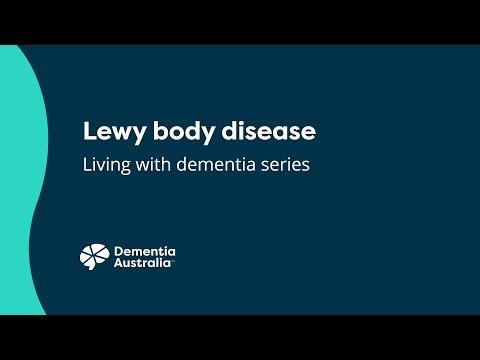Lewy body dementias
Key points
“Lewy body dementias” is an umbrella term describing two forms of dementia: dementia with Lewy bodies and Parkinson’s disease dementia.
Lewy body dementias cause changes in your thinking, movement, behaviour and bodily functions.
There is no known cure for the Lewy body dementias yet, but the conditions are manageable and some symptoms can be treated. Support is available.

About the Lewy body dementias
“Lewy body dementias” is an umbrella term describing two forms of dementia: dementia with Lewy bodies and Parkinson’s disease dementia.
These two forms of dementia are grouped together because they both involve damage to the brain caused by Lewy bodies.
A Lewy body is a tiny tangle of protein called alpha-synuclein inside brain cells. These tangled proteins cause damage that affects your movement, thinking and behaviour.
Over time, as Lewy body dementia develops, your memory, thinking and behaviour will become more affected.
There is no known cure for Lewy body dementia. But there is medication, treatment and support to help you live the best life you can.
Causes of Lewy body dementias
Anyone can develop Lewy body dementia, but it becomes more common as you get older. More than 100,000 Australians have Lewy body dementia.
Right now, we don’t understand well why Lewy bodies form.
Types of Lewy body dementia
There’s debate in the medical field about what terms to use in diagnosing people with Lewy body dementias. But you might be given a diagnosis with one of these two terms:
Parkinson’s disease dementia
If you have already been diagnosed with Parkinson’s disease, and at least a year later you start experiencing symptoms of dementia (like changes in your thinking abilities), you will likely be given a diagnosis of Parkinson’s disease dementia.
The progress of Parkinson’s disease dementia can be quite slow compared to other forms of dementia.
Dementia with Lewy bodies
If you have a diagnosis of dementia, and then at least twelve months later you begin to experience symptoms of Parkinson’s disease, you’re likely to receive a diagnosis of Dementia with Lewy bodies.
The most common movement symptoms of Parkinson’s disease are:
- tremors, typically when you’re at rest
- rigidity, or muscle stiffness
- slow movement, which is called bradykinesia
- trouble maintaining your posture and balance.
Symptoms often begin only on one side of your body, then spread to the other over time.
Dementia with Lewy bodies can cause those symptoms, with these differences:
- less tremor, or tremors when you’re at rest or when using your hands
- more stiffness in your torso
- earlier balance problems
- symptoms on both sides of your body.
The progress of dementia with Lewy bodies tends to be faster than the progress of Parkinson’s disease dementia.
Not everyone who has dementia with Lewy bodies will be diagnosed with Parkinson’s disease.
To make things simpler, we’ll refer to both of these conditions as “Lewy body dementia” from here on.
Signs and symptoms of the Lewy body dementias
Both kinds of Lewy body dementia affect your thinking, behaviour, movement and bodily functions.
Your symptoms will depend on which brain area is affected and the stage of your dementia. They can change over time.
Many of these changes can come and go. It’s called fluctuations. You might find changes to your abilities that last a few hours or a few days.
Thinking changes
You might have changes to your thinking abilities that could last for minutes, hours or days. They’re called cognitive fluctuations.
These changes make it harder to carry out daily activities and interact with people.
Here are common thinking changes you might experience.
Attention
You might find it harder to:
- be alert
- react to new or changing situations
- concentrate
- cope in noisy places
- drive safely
- multitask.
Planning and reacting
You might find it harder to:
- think logically
- make decisions
- plan, organise and do everyday activities
- respond to people quickly.
These changes might make you feel anxious about changes to routines. People might think you’re not listening when you take a long time to answer.
Vision and judging distance
Lewy body dementia can affect your vision and your sense of where things are. If it does, you might find it harder to:
- drive safely
- judge distances
- fix broken things
- walk safely on uneven surfaces or stairs
- move around without bumping into things or falling
- see food on a plate
- understand concepts like near, far, left, right and so on.
Memory
You might experience memory loss, but it isn’t as common in the Lewy body dementias as it is in other kinds of dementia.
There are different types of memory that can be affected by Lewy body dementia.
Working memory helps you process information from moment to moment. If your working memory is affected by Lewy body dementia, you may struggle to make new memories.
Implicit memory is everything you remember automatically, like riding a bike or the words of your favourite song. Lewy body dementia isn’t likely to affect your implicit memory. However, your ability to use the habit or skill may be affected.
Explicit memory helps you retain long-term memory for events, experiences and knowledge.
Behaviour changes
Lewy body dementia can affect your behaviour. Some are more common than others.
Here are common behaviour changes you might experience.
Hallucinations
Hallucinations are things that you see, hear or otherwise sense that aren’t real.
If you have Lewy body dementia, you might have hallucinations that seem very real and last for some time.
Some hallucinations are mild, but they can also be frightening.
Hallucinations often involve family members, but they can be of other people or animals, including spiders and snakes.
After the hallucinations go away, you can usually understand that the things you experienced weren’t real.
If you’re experiencing hallucinations, you might need other people to notice and get you the medical help you need.
Delusions
Delusions are where you believe something that isn’t true.
If you’re having delusions, they can seem so real that you’re not able to understand that it’s not true. Delusions can be confusing and frightening.
If you’re also having hallucinations, they might connect to your delusions. For example, if you see and hear a person who isn’t there, that’s a hallucination. If you start believing that person lives in the room upstairs, that’s a delusion.
It’s common to have delusions where you believe people are doing things to you against your wishes. You might believe someone is stealing your things, or that you’re being given poison instead of medication.
If you’re experiencing delusions, you might need other people to notice and get you the medical help you need.
People with Lewy body dementia can have severe reactions to antipsychotic medications. If you’re getting emergency or urgent medical care, you or the person with you should tell the people helping you that you have Lewy body dementia.
Anxiety, depression and apathy
Lewy body dementia can make you feel very anxious or depressed. They can also make you feel like you care less about things and lose interest in the world. This is called apathy.
You might experience these at the same time.
If you’re feeling anxious, depressed or apathetic, talk to your doctor. Medication and counselling can help.
Disturbed sleep
A common effect of Lewy body dementia is disturbed sleep.
When you’re asleep, your brain stops your body from acting out what’s happening in your dreams. But Lewy body dementia can stop your brain doing this, meaning you act out your dreams and could hurt yourself or your sleeping partner.
More than half of people with Lewy body dementia experience this. It’s called REM sleep behaviour disorder (RBD).
RBD often starts many years before any other symptoms, so it’s an early warning sign for Lewy body dementia.
Other behaviour changes
You might experience and focus on physical symptoms that cannot be medically explained, like:
- pain
- weakness
- shortness of breath.
If you experience any of these, talk to your doctor.
Bodily function changes
Lewy body dementia can damage your autonomic nervous system, which is the part of you that controls your bodily functions.
Here are some of the more common bodily function changes you might experience.
Urinating
You might need to urinate repeatedly at night. Twenty times is not uncommon. This is sometimes mistaken for prostate problems.
Bowel movements
You might experience:
- constipation
- an urgent need to go to the toilet
- bloating
- nausea.
Sex
People with Lewy body dementia can experience a lowered desire for sex, or inability to have sex. More rarely, people sometimes want more sex.
Body temperature
Your body might have trouble keeping your body temperature where it should be. You might find yourself shivering or sweating, regardless of the temperature around you.
Heart health
You might experience an irregular or rapid heart rate. If you do, talk to your doctor as soon as you can.
Blood pressure
Lewy body dementia can affect your body’s ability to keep your blood pressure at the right level. You might experience:
- becoming light-headed or fainting when you stand up after sitting or lying down for a while (orthostatic hypotension)
- dizziness
- drowsiness
- falling
- fainting.
Speaking
Lewy body dementia can make your speech slower and less clear.
Swallowing
You might also swallow less frequently. You might lose your gag reflex, which puts you at higher risk of choking on food or drink, or having food enter your lungs, which can cause pneumonia.

Diagnosing Lewy body dementia
The Lewy body dementias can be hard to diagnose, because there can be a variety of symptoms in the early stages.
Getting an early diagnosis can also be harder when your physical signs are mild. You might do well on screening tests, or you might not show symptoms when you see your doctor.
Your family and friends can help by talking to your doctor with you. You can ask for a referral to a specialist, like a geriatrician or a neurologist.
A medical specialist will only make a diagnosis of Lewy body dementia after careful assessment. This might include:
- brain imaging
- blood tests
- testing your thinking and behaviour
- medical tests as requested by a doctor or medical specialist
- your detailed medical history.
Specialists may also interview your family members. To help, your family could keep a diary of what they notice about your thinking, behaviour and movement for a week before the appointment.
Even with these tests, it can take time to make a diagnosis. Your doctor might prescribe medication for your most pressing health issues and suggest a “watch and review” plan. This means waiting for some time then doing the tests again to see what has changed.
If your doctor rules out any other causes, they might make a diagnosis of Lewy body dementia.
In this video, Associate Professor Dr. Michael Woodward talks to you about the ways Lewy body dementia can present and why it’s often misdiagnosed.

Treatment and management of Lewy body dementia
There’s no known cure for Lewy body dementia yet, and no treatment to stop the condition from progressing.
There are ways to manage your condition, however. Your doctor might prescribe anti-depressant or anti-anxiety medication. They may also prescribe medications for your heart, urinary and other symptoms.
People with Lewy body dementia can have severe reactions to antipsychotic medications. If you’re getting emergency or urgent medical care, you or the person with you should tell the people helping you that you have Lewy body dementia.
Counselling and exercise help you stay active and social.
If you’re at risk of falls, talk to an occupational therapist. They can:
- help you get supportive equipment, like a cane or a walking frame
- assess your home for safety
- help you get special furniture and rails so you can stay independent and safe at home.
Some other tips to help you and your family manage Lewy body dementia include:
- Ask people you trust for help. Family and friends can help you make legal, financial and medical decisions if you’re having trouble with thinking and planning.
- Have a back-up plan. If you find some social or physical situations difficult, you might need to quickly change your plans. Make that plan early, so you’re not stressed in the moment.
- Be prepared. Accidents happen. Keep a kit with wipes, bags and a change of clothes so you’re always ready, just in case.
- Have one-on-one time. If big groups of people are stressful, organise your social time in smaller groups, or even just with one person, in a quiet place where you feel safe.

Dementia with Lewy Bodies presented by Professor Simon Lewis
In this video we are joined by Simon Lewis, highlighting some of the challenges posed by the variety of ways in which Dementia with Lewy Bodies can present, as well as common symptoms and their management in the clinic.


More support
For more information and support, visit Parkinson’s Australia, the national body representing people living with Parkinson's disease, their families and carers.
How Dementia Australia can help
Whatever your experience of dementia, we're here for you.

